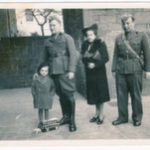
Testimonies
Click on the name to listen to their voices and read their testimonies
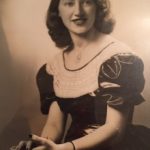
Alice Malcolm
Alice Malcolm was born in Vienna. She witnessed the rise of the Nazis in Austria as early as 1936, when her mother left her to go to England. She escaped to England and served as a kitchen maid and general help in a grand country house. She ended up in Scotland and became a nurse.
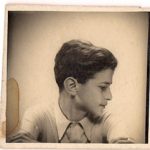
Bob Kutner
Bob was born in Germany into a Polish Jewish family. They moved to France and then Italy after Hitler came to power in 1933. There, Bob helped his brother spy for France. His brother was caught but not Bob. He escaped as a tourist to England where he joined the army and became an interrogator of POWs. He became a clothing agent and married Barbara.
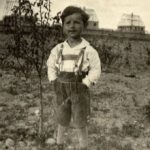
Bob Mackenzie
Bob was born in Chemnitz, Germany, of a Jewish father and non-Jewish mother. He was not brought up Jewish. After his father was sent briefly to a concentration camp, he was sent on the Kindertransport to Scotland. He was brought up by a Scottish family and changed his name to theirs in gratitude. His parents both survived the war but ended up in East Germany so it was very difficult for them to meet again.
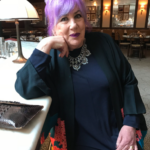
Dany Metzstein
Dany Metzstein (Danielle Kahn) was born in Montpellier, France in 1942. Her parents were in hiding and her father was involved with the Maquis. They survived the war in France, but after her father died, Dany had to stay in an orphanage and then a boarding school. She came to live in Motherwell, Scotland with mother, stepfather and brother and later met the love of her life, Isi, and had three children.
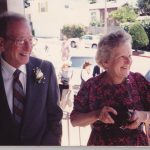
Dorothea Brander
Dorothea was born in Berlin. Her father was a chemist and was sent to work in Istanbul to escape from Germany. She describes her life in Turkey. Her brother organised support for non-Nazi Germans who were interned during the war in villages by the Turks. Dorothea married on V.E. Day and came to Glasgow, which did not impress her at all! Thereafter she travelled widely with her husband when he worked for the British Council.
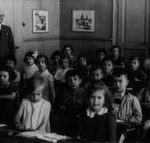
Dorrith M. Sim
Dorrith was born in Kassel, Germany. She witnessed Kristallnacht, when her own home was vandalised, so her parents decided she should go to Britain on the Kindertransport. She describes how she taught herself English by saying everything was "in my pocket" and wrote a children's book with that name on the experience of being a refugee. She settled in Scotland and founded SAROK, the Scottish Annual Reunion of Kinder.
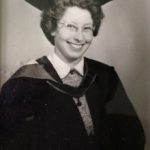
Edith Forrester
Edith was born in Nordhausen, Germany. She describes what happened when the Gestapo arrived at her home and arrested her father. She speaks of her departure from her family when she joined the Kindertransport and her mother's failure to escape. She emphasises her love of Britain, her pride in being Jewish and her Christian faith.
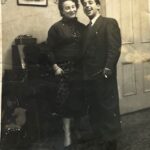
Erna Grace
Erna Grace (Rabner) was born in Dortmund, Germany in 1930. Erna came on the Kindertransport when she was only eight years old. She had diphtheria while living in the reception camp in Harwich. She was taken in by Nurse Livingstone and her family In Glasgow with whom she lived with till she married. Sadly, she never saw her parents again. Erna was a hairdresser and married Jack.
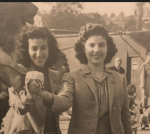
Esperance David
Born in Baghdad, Iraq, Esperance describes life there and the challenge being Jewish brought to her family especially after the rise of Hitler. She speaks about the Farhad, the pogrom against the Jews of Baghdad in 1941. She explains what happened to her Iraqi family in 1948 and thereafter, and her later experiences in Britain.
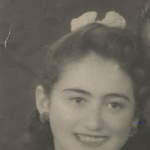
Eva Szirmai
Eva was an apprentice photographer in Budapest but could not be fully trained because she was Jewish. She lived in constant danger of deportation under the Nazis and her mother barely escaped. Eventually they lived in the ghetto, which by chance saved their lives. She then lived in Communist Hungary until her husband, who was a singer, found a job as a synagogue cantor in Glasgow.
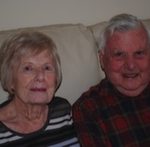
Evelyn Strang
Evelyn was born in Leipzig in 1933. Evelyn and her mother were deported to Poland in 1938 but managed to escape to Britain as her father had set up a factory. Her Polish grandparents did not survive. The other grandparents lived in Berlin throughout the war. Her father set up a furrier's business in Glasgow. Evelyn worked in the business too then married and had children.
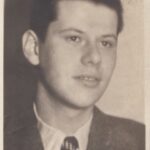
Fred Weiss
FRIEDRICH (Fridyes in Hungarian) LOTHAR WEISS, better known as Fred Weiss, was born in Miskolc in Hungary on May 23rd 1921. He lived most of his adult life in Glasgow, Scotland and epitomised the ideal of how a poor young refugee could make good by hard work and strong will.
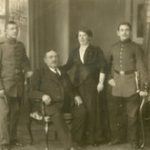
Frieda Laird
Frieda's father was a baker and she lived on a farm. Aged 18, she came to the UK as a domestic but lost all her family. She had a difficult marriage and had to raise 5 children on her own. She worked as a pedlar round Glasgow.
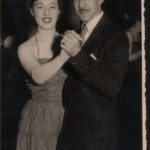
George Taylor
George was born in East Prussia. His mother came to Glasgow first and then he joined her on the Kindertransport. He travelled from London on his own but his mother went to the wrong station in Glasgow and he had to be rescued by a Yiddish speaking taxi driver. He was very sporty and gave gymnastic displays at Maccabi sports centre. He was in the Territorial Army for a while and had several jobs as a driver and then in a bedding factory.

Gerda Fulton (Grunewald)
Gerda was born in Beuthen, Upper Silesia, Germany, in 1919. In January 1939, she was forced to flee the Country arriving in the UK. Her parents were not so fortunate, They were transported to Auschwitz whence they perished. Gerda was subsequently dispersed, by the Jewish Committee, to Glasgow where she stayed the remainder of her life. In March 1941, she married the German Jewish Refugee Kurt (Charles) Fulton at South Portland Street Synagogue in the Gorbals.
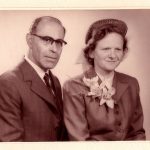
Gretl Shapiro
Gretl was born in Vienna and had a happy childhood until the Nazis came. She was sponsored by the Quakers to come on the Kindertransport to England, where her sister was working as a domestic. She originally stayed in Coventry but was evacuated several times because of the Blitz. She became an entomologist and moved to Glasgow where she married. She became a well known potter but said her greatest achievement was having children to spite Hitler.
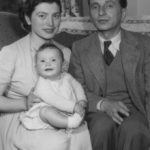
Halina Moss
Halina was born into a politically active family in Warsaw in 1929. Her father was a Bundist and imprisoned by the Tsar along with Trotsky's wife. Her family escaped to Russia and ended up in Siberia in extreme conditions. After the war she came to Glasgow and trained as a science teacher but changed to maths because the chemical experiments were too dangerous.
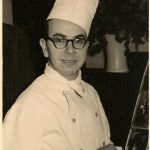
Henry Wuga
Henry grew up in Nuremberg and trained as a chef. He came to Scotland on the Kindertransport but due to a misunderstanding he was interned as a possible spy on the Isle of Man at age 16. He became the leading chef in the Glasgow Jewish community and received the MBE for work with disabled soldiers. He was married to Ingrid (see her testimony) for over 70 years.
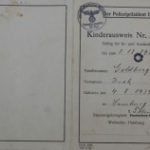
Ike Gibson
Ike, born in Hamburg, came from a very religious family. He remembered little of his journey to Britain on the Kindertransport. Once in the UK he quickly integrated. He describes his experiences in the Queen's Scouts and in National Service. Ike became an academic specialising in bacterial and viral genetics. He fulfilled a life's ambition when he retired to Ullapool.
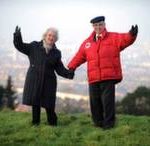
Ingrid Wuga
"... I will never, never forget waving goodbye to my parents when I was on the train and they were on the platform running along." In 1939, Ingrid came to Britain on the Kindertransport from Germany. Her parents did manage to escape and the family were reunited in Scotland. She married Henry (see his testimony) and had a long happy marriage. She helped him in his work with disabled soldiers.
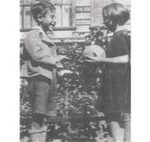
Isi Metzstein
Born in Berlin, Isi describes watching the synagogue adjacent to his school burning on Kristallnacht, while a crowd of local people stood by enjoying what was happening. He reached Scotland in 1939, first living in Hardgate and then in a hostel in Skelmorlie. He explains how he became a world renowned architect and reflects on his career.

John J Crosbie
John was a Scottish Lieutenant in the Royal Artillery who was haunted by his experience of being part of the British Forces which entered Belsen Concentration Camp in April 1945. In his memoir he describes the horrors he saw. The situation was chaotic. Hundreds of Jewish internees were dying every day and over 10,000 bodies lay unburied. The SS guards remained unrepentant.
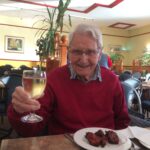
John Mackay
John Stewart MacKay, a Scottish soldier who married a Hungarian Holocaust survivor, had a truly remarkable life. He describes his army experiences as a commando in great detail including the attack on Tobruk. Then he explains how he and his friend escaped from an Italian prisoner of war camp and speaks of the Italian families who hid them and helped them survive. We also learn of his great love for over 70 years, Eci, (Edith) and the very special circumstances that brought them together.
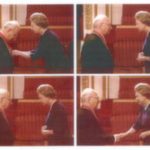
John Subak Sharpe
Professor Subak Sharpe was born in Vienna. He came on the Kindertransport. He was originally placed as a farmer's boy because he was regarded as not worth educating but ran away to the army. After the war he studied genetics and later switched to virology. He became director of the Institute of Virology in Glasgow University and was awarded a CBE and the CIBA medal for his contributions.
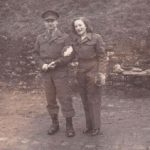
Judith Rosenberg
Judith was born in Hungary and had a happy childhood until the Nazis invaded in 1944. Her family was sent to Auschwitz, where her father was immediately killed. She and her mother were saved by being sent to work in a munitions factory in Germany. She was liberated by the Americans and worked as an interpreter. There she met her husband and he took her back to Glasgow.
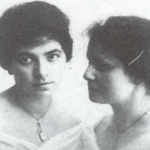
Karola Regent
Karola (Hannah) was born in Dusseldorf in 1925. She describes the horror of Kristallnacht in her parent's flat with the Nazis being "...the fanatic horde of raving animals...smashing and slashing". She and her sister escaped on the last Kindertransport. Sadly, her parents did not survive. In 2003 her primary school was renamed in her honour as the Hannah Zurndorfer school.
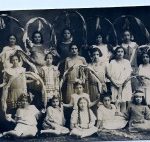
Kathy Hagler
Kathy was born in Hungary in 1942. Her father was taken away when she was one year old and she and her mother were taken to the Munkacs ghetto in 1944. She was smuggled out to her grandmother's in Budapest just before the ghetto was liquidated. She emigrated to Israel in 1959 and stayed on a kibbutz for ten years before moving to Scotland, where she became a journalist.

Leo Metzstein
Leo, one of five children born in Berlin, came to Scotland with two siblings on the Kindertransport (see Isi Metzstein, his brother). His father, a Communist, was killed in 1933. He first lived with a Quaker family, then in a hostel in Skelmorlie. Failing his "11 Plus" exam by one mark meant that he did not receive an academic education, though he went on to have an interesting variety of work experiences.
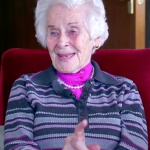
Lore Lucas
Lore actually came to Britain twice, in 1936 and just before the war. Her sister had arrived earlier but unfortunately she and her mother went back to Holland to join her father the day war broke out and were trapped. She never saw them again. Lore did war work and married during the war. This did not work out and she eventually had a second happier marriage after the war.
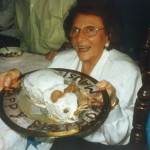
Marianne Grant
Marianne was born in Prague. Her daughter, Geraldine, speaks of her mother's comfortable life, her love of art, which eventually helped her to survive, and the German invasion in 1939. Two years later Marianne and her mother were sent to Theresienstadt, then to Auschwitz, later to a slave labour camp and finally to Bergen-Belsen, where they were liberated. She became a well known artist.
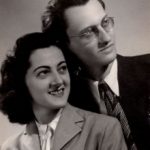
Marianne Laszlo
Marianne was born in Hungary. When the war came her family was sent to Vienna as slave labourers. She worked to clear the roads from snow and debris from bombs. She stayed in Hungary and married, but had to escape after the 1956 uprising. She moved round the country as her doctor husband had several jobs but eventually settled in Edinburgh, where she had 3 sons.
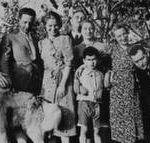
Marion Camrass
Marion was born into a wealthy family in Krakow. Her family fled the fighting east into Russia, where they were interned as Poles and sent to a logging camp in Siberia. After they were released from there, they travelled through Kazakhstan and ended up in Uzbekistan for the rest of the war. In 1946, she joined her aunt in Glasgow, where she completed her education and married a doctor.
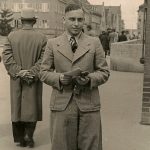
Martin Anson
Martin was born in 1909 in Leutershausen, Bavaria, Germany. The town became very anti-Jewish in the early 1920s. He describes his activities in the anti-Nazi movement Reichsbanner and their fight to keep Germany democratic. In great detail Martin describes the Stormtroopers assaulting the family on Kristallnacht and his imprisonment in Dachau, before managing to emigrate to England in 1939.
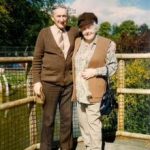
Moniek Garber
Moniek was born in Wolozin, which was mostly Jewish. By the end of the war, 95% had been killed, including his father. At age 15, Moniek defaced a poster of Stalin and was sent to a concentration camp in Siberia, which saved his life. He then joined the Polish army and travelled widely before settling in Scotland. He became a nuclear physicist.
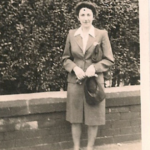
Pat Anson
Pat (Beate) was born in 1916 in Kriegshaber, Bavaria, Germany and lived a normal village life with loving parents who were cattle dealers. After Kristallnacht, her parents sent her to Bradford in Yorkshire where she worked as a children's nanny. After being interned on the Isle of Man, Pat worked in a clothing factory before moving to Glasgow and marrying Martin Anson. Her parents were murdered in Auschwitz.
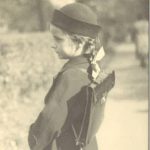
Renate Mackay
Renate was born in Cologne in 1931. She talks about her mother's premature death, her father's arrest and the reason she was adopted by her mother's sister and her husband. Her new 'father' was the eminent astronomer Erwin Finlay Freundlich. Initially she moved with them to Turkey and then Prague. Then she came to Scotland where she became a nurse much later.
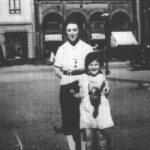
Rita McNeill
Rita came from Hannover, Germany and was only nine when she and her mother were arrested by the Nazis. Thanks to an aunt, she was released and came to Britain on the Kindertransport. She believed her mother would arrive soon, and did not know the truth of what had happened to her until years later. She had a difficult childhood in Glasgow but fortunately then met her dear husband and was happily married for 61 years.
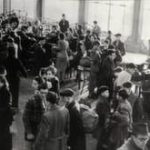
Rosa Sacharin
Rosa was born in Berlin. She describes the devastating effects of the racial Nuremberg laws on the Jews. She came alone on the first Kindertransport. Amazingly, her mother and sister survived and joined her in Glasgow. She became an eminent paediatric nurse, wrote a widely used textbook, and was happily married to Joe for over 50 years. She was involved with SAROK, a Kindertransport reunion organisation, for many years.
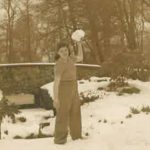
Ruth Fraser
Ruths' journey took her from Germany to Switzerland, London, Scotland and finally back to Germany. After coming to Glasgow to do war work she married another German refugee in 1945. In 1958 Ruth, her husband and her daughter moved to Hamburg, Germany, where her husband joined his brother who owned a chocolate factory.
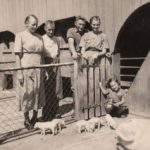
Saskia Tepe
Saskia was born in 1954 in a Displaced Persons camp outside Nuremberg. Her mother, Brigitte, suffered greatly under the Nazis as a Mischling (mixed ancestry), then under the Czechs as a Sudeten German, and finally as a refugee in a DP camp. Despite everything, Saskia and her mother made a life for themselves in Britain and Brigitte enjoyed being a grandmother.
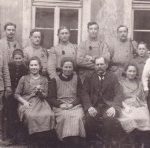
Sidney Mayer
Sidney was born in Landau, Germany. His father owned vineyards. On Kristallnacht his father was arrested and sent to Dachau and the family was forced to move to Mannheim. Sidney was sent to Britain on the Kindertransport but his parents were murdered in Auschwitz. He arrived in Dovercourt where a Glasgow family offered him a home.
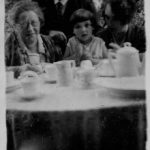
Sonja Hancox
Sonja was born in Berlin, where her mother ran a dry cleaning business. Unlike Jewish professionals who lost their jobs in Nazi Germany, her mother was able to work and helped support those who were no longer earning. Her Polish father left for Thailand ending up in Shanghai. Sonja and her mother escaped Germany at the last possible moment before their passports expired.
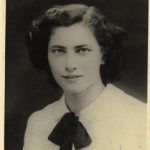
Susan Singerman
Susan was born in Szekesfehervar, Hungary. Three months after the Germans occupied Hungary, in June 1944 she and her family were sent by cattle truck to Auschwitz. Chosen to live by the notorious Josef Mengele, Susan was the only member of her family to survive. She describes the horrors of life there and later in a slave labour camp in Lippstadt, Germany.
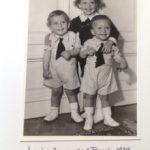
Suzanne Ullman
Suzanne was born in Budapest. At the start of the war, her parents were in London and they were separated for 7 years. She lived in a "starred house" for Jews for a while with her brothers and grandmother but was saved by being taken to a Wallenberg house. When the Russians invaded, they lived in a cellar for weeks. After the war, she rejoined her parents in London. She studied for a PhD and worked as a zoologist in Glasgow University.
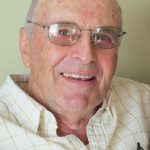
Walter Gumprich
Walter was born in 1933 and lived in Munster, Germany. His mother was a professional athlete and ran a sports car which she "loaned" to the Nazi party so she could use it whenever she wanted. His father had an Iron Cross 1st Class from WW1. With the help of a Catholic priest they escaped from Germany, and Walter studied agriculture at a college and farm in Ayrshire. He later emigrated to Canada to take up work with the Grain Exchange.

